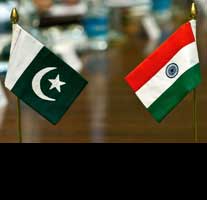
New Delhi, July 4: India will give Pakistan a dossier on 26/11 handler Abu Jundal during the talks between the Foreign Secretaries of the two countries to be held today in Delhi. The dossier will include Jundal's passport issued by Pakistan, indicating the involvement of its state agencies in the Mumbai attacks that took place in 2008.
Pakistan's Foreign Secretary Jalil Abbas Jilani is in New Delhi for talks with his Indian counterpart. Though he has said that he has been given the mandate to carry forward the dialogue process with India, terror and the recent arrest of 26/11 handler Abu Jundal is likely to overshadow the day-long talks.
"We have seen reports of Abu Jindal and we have requested Indian government to share reports with us and we would definitely try and do something about it," Mr Jilani said soon after his arrival on Tuesday.
Foreign Affairs Minister SM Krishna told NDTV, "(We) always discussed terror during Indo-Pak talks, will do now also. Whatever Jundal has revealed to our agencies will be evaluated. We will have to make value judgment on whether we can trust Pakistan." (Watch)
Islamabad says it wants hard evidence from India on Jundal's Pakistan connection, and while they have denied issuing him a passport, on the eve of the talks, Indian security agencies released copies of what they said was Jundal's Pakistani passport. (Read: Jundal's passport shows him as a Pakistani national)
Sources say these details will be shared with the Pakistani delegation and New Delhi will ask Islamabad to investigate how this passport was issued.
India will share details of the control room Jundal has talked about in Karachi and will again ask for the voice samples of those identified by him. India will also hand over a list of Jundal's Pakistani contacts given by him during his sustained interrogation by the security agencies.
Sources, however, say that no operational details or leads which are being followed up will be shared with Pakistan.
Last week, Home Minister P Chidambaram strongly stated that Jundal's arrest showed there was state support for the 26/11 attack. It evoked a sharp reaction from Pakistan's Interior Minister Rehman Malik who said that India was failing to control its own citizens.
Sources say India will also raise the issue of Sarabjit Singh - the Indian who is accused of spying in Pakistan and currently on death row.
The issue of Jammu and Kashmir and friendly exchanges such as visas are also on the agenda. Last month, Pakistan unexpectedly put off a liberalised visa agreement with India at the Home Secretary- level talks.
Separatists from the Valley today met Pakistan Foreign Secretary Mr Gilani. They were divided on the dialogue process between India and Pakistan. The moderates termed it as necessary for building 'mutual trust' while hardliners dubbed it as a 'futile exercise'.
The two sides will also try and make headways on two very crucial issues - Siachen and Sir Creek.
The meeting of the Foreign Secretaries is meant to pave the way for a meeting of the Foreign Ministers of the two countries later this year.




Comments
Add new comment